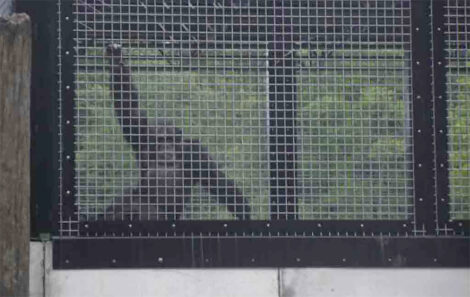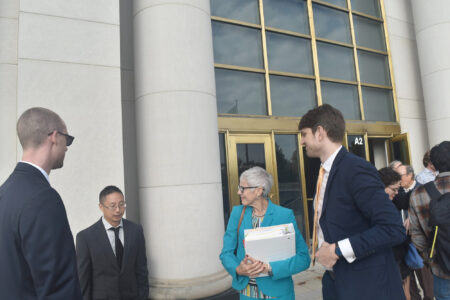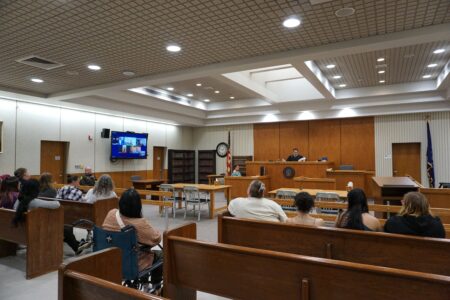Appeals court questions rights for chimpanzees in UP zoo
- A chimpanzee identified as Tommy is shown in a 2017 letter by PETA to the USDA requesting an investigation of the DeYoung Family Zoo in Menominee County. (Photo courtesy of the Nonhuman Rights Project, via Michigan Advance)
- Attorneys representing seven chimpanzees at the DeYoung Family Zoo in Wallace gathered outside the Michigan Hall of Justice after a hearing Tuesday in their case before the Michigan Court of Appeals. (Katherine Dailey | Michigan Advance)
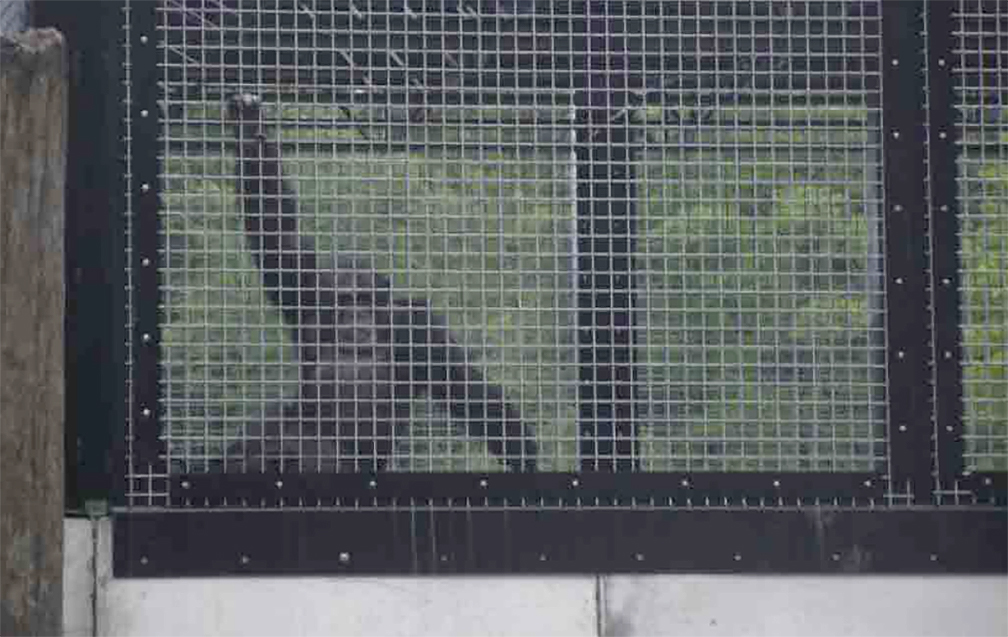
A chimpanzee identified as Tommy is shown in a 2017 letter by PETA to the USDA requesting an investigation of the DeYoung Family Zoo in Menominee County. (Photo courtesy of the Nonhuman Rights Project, via Michigan Advance)
A case of whether seven chimpanzees at the DeYoung Family Zoo in Wallace should be granted habeas corpus rights was heard by the Michigan Court of Appeals on Tuesday.
In the hearing, judges and lawyers debated the threshold — if not biological species — of when to grant such rights.
The Nonhuman Rights Project, a legal advocacy organization, has sued the DeYoung Family Zoo for living conditions that they consider to be violations of the bodily liberty of chimpanzees housed there.
Lawyers for the chimpanzees are seeking an order to hear the merits of the case — essentially, to have a decision on the content of the case, as opposed to procedural matters — in the suit for the habeas corpus rights of seven chimpanzees, who the group refers to as the “DeYoung Prisoners”.
“It’s a novel issue, obviously,” said Judge Brock Swartzle, the presiding judge in the hearing, as he and fellow judges Matthew Ackerman and Christopher Trebilcock considered the arguments presented by Jake Davis, the attorney for the Nonhuman Rights Project.
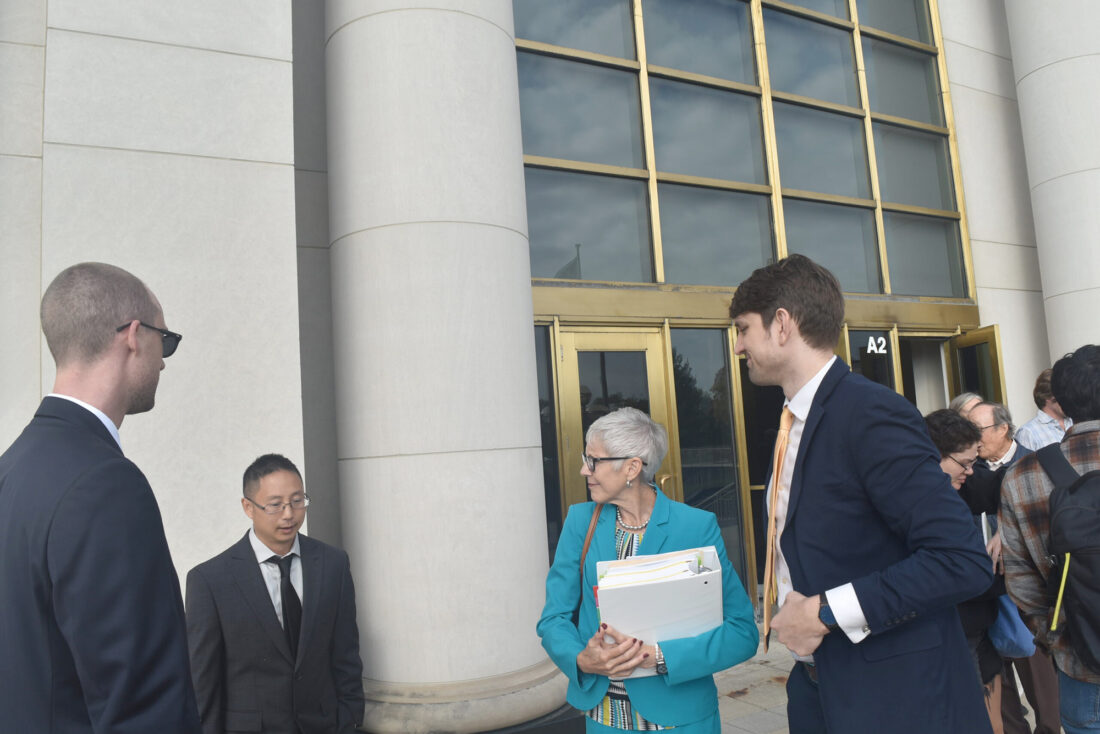
Attorneys representing seven chimpanzees at the DeYoung Family Zoo in Wallace gathered outside the Michigan Hall of Justice after a hearing Tuesday in their case before the Michigan Court of Appeals. (Katherine Dailey | Michigan Advance)
The Menominee County Circuit Court dismissed the case in December 2023, determining the law’s use of the word “person” made the chimpanzees ineligible for the relief that their lawyers were seeking — transfer out of the DeYoung zoo, which they called in the hearing an “unjust confinement,” to a designated sanctuary.
The Nonhuman Rights Project filed its appeal in January 2024, arguing that Michigan common law — not a statute that includes the word “person” — should determine the outcome of the case, instead relying on the autonomy of chimpanzees.
For those representing the chimpanzees, the case goes beyond these seven animals, however.
“What’s at stake here really is whether suffering chimpanzees are entitled to go to a sanctuary, and also whether protection of liberty and autonomy is going to remain the supreme law in Michigan or whether it’s going to get truncated,” Christopher Berry, the executive director of the Nonhuman Rights Project, said after the hearing’s conclusion.
Davis presented judges with the story of Tommy, another chimpanzee that had been at the DeYoung Family Zoo and died there, as an example of why the seven chimpanzees named in the case should be granted habeas corpus rights.
When Tommy was moved without notice from a zoo in New York to the DeYoung zoo, it “epitomized his status as a rightless thing, his legal status as a rightless thing,” Davis said. “Tommy could be bought, could be sold, he could be used and he could be trafficked, all without the slightest hiccup.”
Swartzle asked Davis how far he would go in expanding habeas corpus rights beyond humans. “You’re asking for something fairly extraordinary,” Swartzle said. “If you want us to go over that line into non-humans, where do we draw a sensible line?”
For Davis, that line is simple — autonomy, which can be defined as “self-determined behavior based on freedom of choice,” he said, presenting research from famed late primatologist Jane Goodall, that chimpanzees largely experience the world the same way humans do.
Goodall wrote similarly in a scientific declaration in the case, filed in late 2023, “There is ample proof from studies of chimpanzee behavior, both in the wild and in captivity, that chimpanzees are autonomous beings with a highly complex cognitive nature, which can be illustrated by their ability to perform complex tasks.”
But for Swartzle, the ability — or lack thereof — of an animal like a chimpanzee to participate in what was referred to as the “social contract” presented questions on whether autonomy was enough to grant rights like these.
Lawyers for the DeYoung Family Zoo, who were not required to appear in court for this hearing, were not present.
While the decision of the court is still forthcoming, Ginny Mikita, a Michigan lawyer working alongside the Nonhuman Rights Project in the case, said after the hearing that she felt positive about the outcome based on how the judges responded to their arguments.
“I’m feeling hopeful,” she said. “The judges today clearly had given a lot of thought to this case and were fully engaged in the argument.”
———
Michigan Advance is part of States Newsroom, a national 501(c)(3) nonprofit. For more, go to https://michiganadvance.com.

